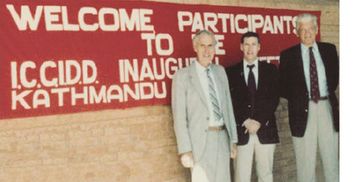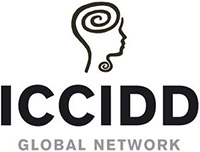Iodine Global Network (IGN)
Sprunglinks/Accesskeys
Zur Startseite (Accesskey 0) Direkt zur Hauptnavigation (Accesskey 1) Direkt zum Inhalt (Accesskey 2) Kontakt (Accesskey 3) Sitemap (Accesskey 4) Suche (Accesskey 5)
DONATE

About the IGN
Established in 1986, the Iodine Global Network is a non-profit, non government organization for the sustainable elimination of iodine deficiency worldwide.
Our vision
Our vision is a world where all people attain optimal iodine nutrition and children can reach their full cognitive potential.Our mission
Our mission is to be the authoritative voice for iodine nutrition. We support and catalyze global and national iodine programs, working with key public, private, scientific and civic stakeholders. We focus on universal salt iodization as the most cost-effective and sustainable solution for prevention of iodine deficiency disorders.Our goals
| 1. | To support the harmonization of national and international iodine program delivery through alignment of approaches, partnerships and resources |
| 2. | To advocate for political will and increased attention and resources for iodine programs in the context of the broader global nutrition landscape |
| 3. | To identify and help address challenges to iodine programs and thereby accelerate progress towards sustained IDD elimination |
| 4. | To support and strengthen national programs and fortification coalitions through consistent programmatic guidance and enhanced communication to, from and among national programs |
| 5. | To identify and address scientific questions and influence the research agenda in order to increase the effectiveness of iodine programs |
A brief history of the Iodine Global Network
(formerly ICCIDD Global Network)
The International Council for Control of Iodine Deficiency Disorders (ICCIDD) had its inaugural meeting in 1986 in Kathmandu, Nepal. Working closely with partners (UNICEF, the Micronutrient Initiative, and the Global Alliance for Improved Nutrition) and national governments, ICCIDD has spurred the global effort to eliminate iodine deficiency for the past 30 years.

The 1986 inaugural meeting of ICCIDD in Kathmandu, Nepal.
Left to right:
Basil Hetzel, John Dunn, and John Stanbury.
The Network for Sustained Elimination of Iodine Deficiency was formally launched in 2002 at the U.N. Special Session for Children. The network was a global coalition of public, private, international and civic organizations that supported universal salt iodization. In 2012, the ICCIDD Global Network was formed from these two organizations.

In 2012, the ICCIDD Global Network was formed from the Iodine Network and ICCIDD.
This powerful alliance shares a common commitment to assist countries in reaching the goal of sustained elimination of IDD. In 2014, the organization was renamed the Iodine Global Network (IGN).
In the changing landscape of iodine nutrition, the IGN draws upon 30 years of experience and expertise of academics, salt industry representatives, and partner organizations.
While IGN continues to play a strong scientific and advisory role on iodine nutrition, it is the network of over 100 regional and national coordinators and partner agencies (the Global Alliance for Improved Nutrition, the Micronutrient Initiative, and UNICEF) who are at the core of its activities and global efforts to eliminate IDD.
In the changing landscape of iodine nutrition, the IGN draws upon 30 years of experience and expertise of academics, salt industry representatives, and partner organizations.
While IGN continues to play a strong scientific and advisory role on iodine nutrition, it is the network of over 100 regional and national coordinators and partner agencies (the Global Alliance for Improved Nutrition, the Micronutrient Initiative, and UNICEF) who are at the core of its activities and global efforts to eliminate IDD.
More
Contact us
See the bang for your buck!
We have teamed up with 'The Life You Can Save' to help donors see the impact of their donations.Subscribe
Sign up to the monthly Iodine Blog or the quarterly IDD Newsletter to follow our work and the global progress towards the elimination of iodine deficiency.